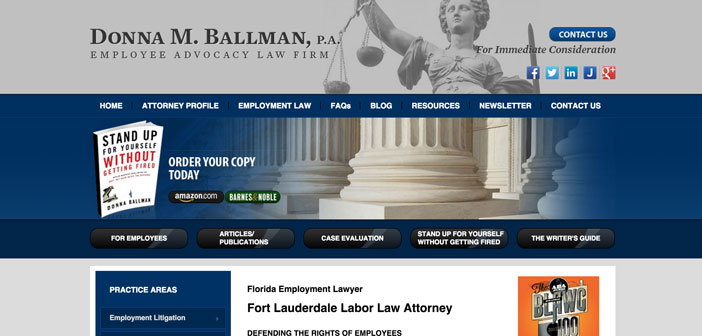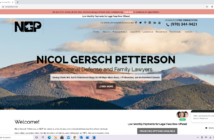Writing on trending issues, tweeting, and speaking have built this Florida solo’s reputation and practice.
Donna Ballman, from her position as a solo employment lawyer in Ft. Lauderdale, Fla., has managed to hoist herself onto a national platform as an authority on workers’ rights. She has accomplished that by writing prolifically about employment law in, among other places, a book, on job-search web sites and the Huffington Post and for her own award-winning blog.
With its cheeky name, “Screw You Guys, I’m Going Home: What You Need to Know Before You Scream ‘I Quit,’ Get Fired, or Decide to Sue the Bastards,” the blog has won acclaim for its “plain-spoken” style. It was named one of the top 25 labor and employment law blogs by Lexis/Nexis and has made it onto the prestigious ABA Blawg 100 list for the last four years in a row.
Ballman says she only occasionally gets clients who tell her that her blog was the main reason they called her. But her widely published commentaries on employment law are the reason she has become a go-to source for reporters. Over the years, she has been interviewed by MSNBC, the Wall Street Journal, Lifetime Television Network, the Daily Business Review and many other media outlets. That has helped assure that in a Google search for a “Florida employment lawyer,” her website and blog are on the first page of hits. And anyone who clicks on those links will find a wealth of information on just about any workplace predicament imaginable.
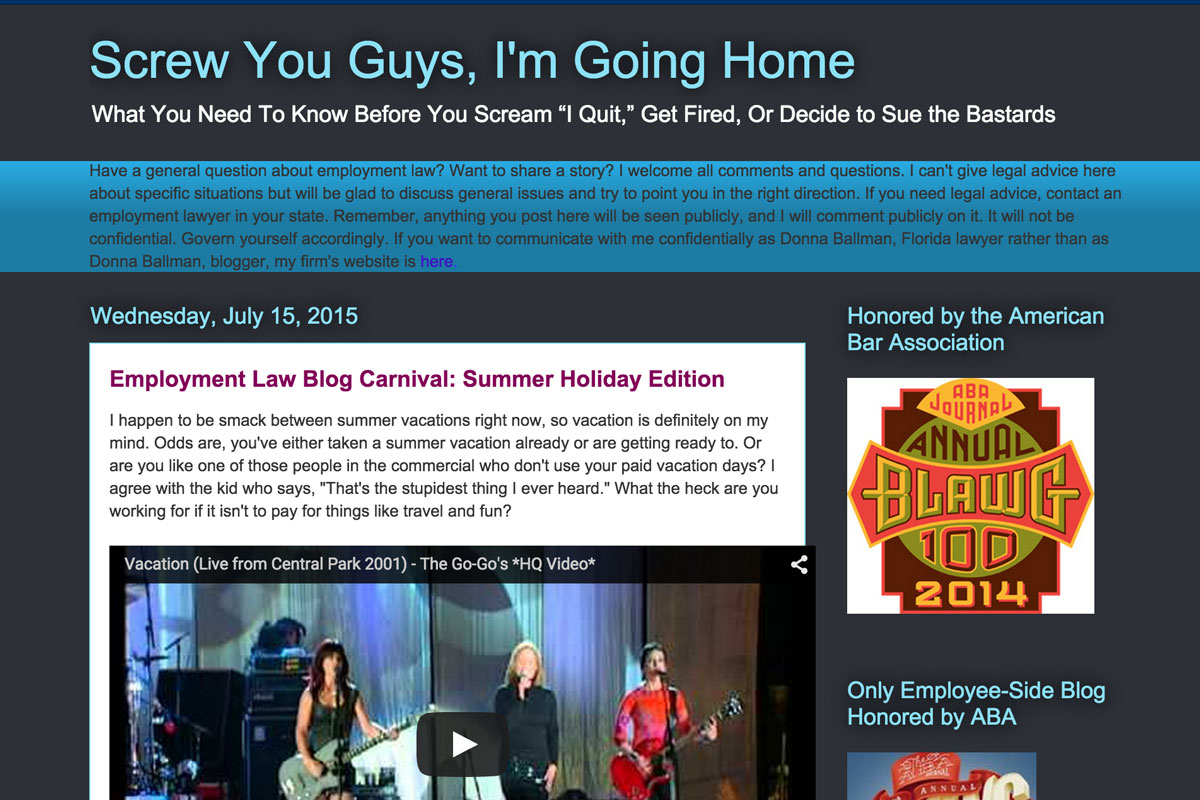
How to Snag Readers
One of the ways she has attracted readers is to write about what people are thinking and talking about at any particular time. It is an art that she perfected while writing a weekly column for AOLJobs.com. Her column in early December, for example, was titled, “8 Holiday Party Survival Secrets from an Employment Lawyer: How to party with colleagues without getting fired.” The next month, when large swathes of the nation were snowbound, she wrote, “Do I Get Paid if We’re Closed for the Blizzard?”
Her all-time biggest hit was about how employees don’t have an unfettered right to free speech in the workplace, which was published amidst the brouhaha in 2013 over racist and anti-gay comments made by the star of the reality TV show Duck Dynasty. “People flipped out about that. It got a quarter of a million views, maybe more, and there were thousands of comments,” Ballman says.
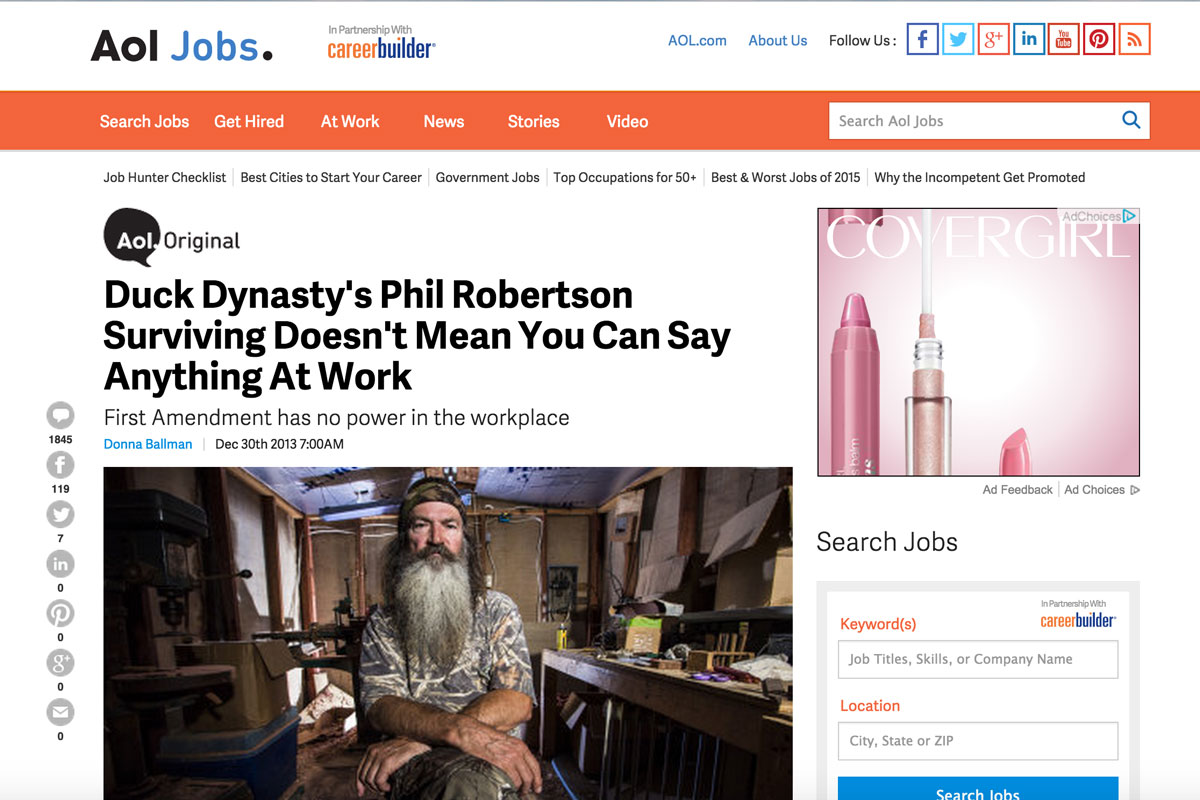
“I don’t think you need to come up with a gimmick to attract readers,” she adds. “But you need to write articles that people are interested in, and right now the big [employment law]issues that people are interested in are gay rights and Obamacare and the Confederate flag in the workplace. There is always so much interesting stuff on employment law in the headlines. And if you write about those issues in a way that is accessible, and you keep it short and sweet and pithy — maybe 500 words or so – and you make a very narrow point with your article, I think you eventually will develop a following.”
Other topics she has covered are not necessarily trending in social media but are perennial issues faced by employees. “My very first post on my own blog, about the top five ways to get out of your non-compete agreement, is still the most popular. It has had 174,000 views so far,” Ballman says.
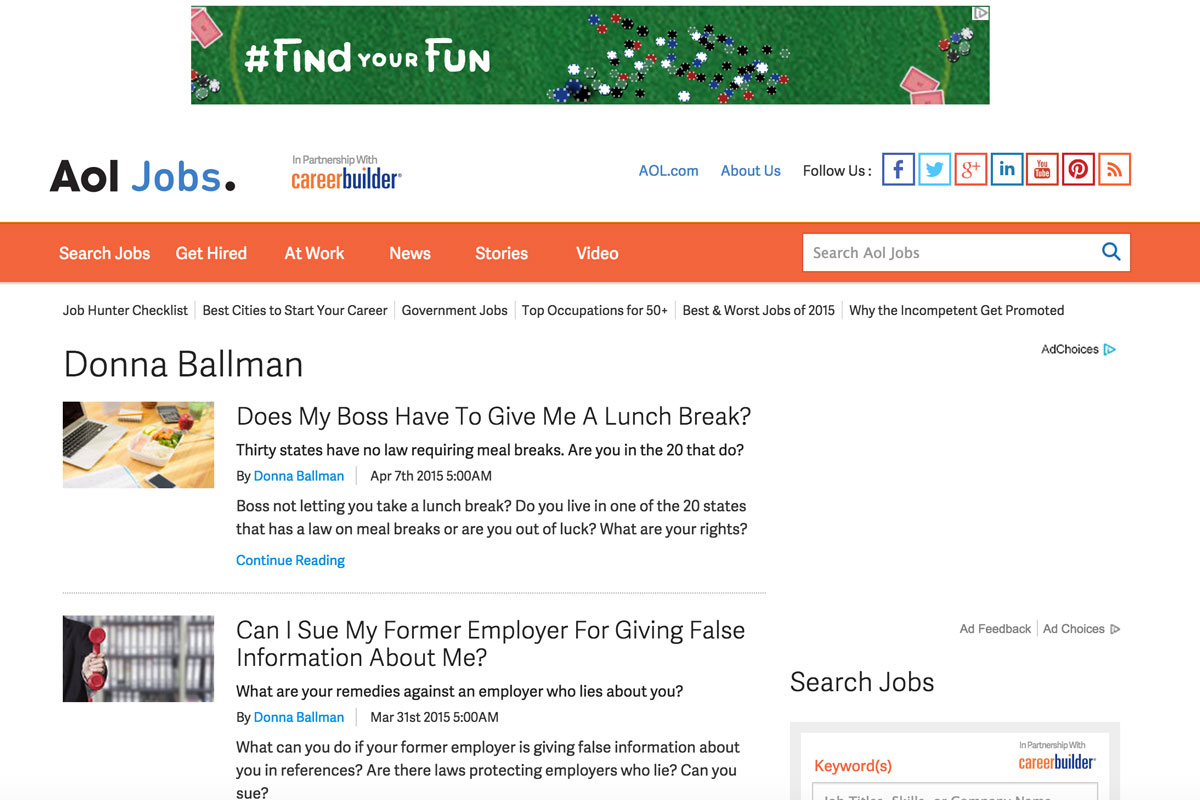
It is also one of her most widely plagiarized posts, as she discovered inadvertently one day. “I was in a litigation matter involving a non-compete agreement and when I Googled opposing counsel to find out what they had written on non-competes, I discovered that they had used my words exactly. I have also been plagiarized by several other law firms and have had to send takedown notices to them,” says Ballman, who now regularly uses a search engine designed to detect plagiarism to keep a lid on that.
In addition to picking topical issues to write about, Ballman has one more tip for lawyers who want to publish a blog that draws readers and wins awards.
“The main thing is, don’t try to sell people anything. A blog is for information,” she says. “In fact, I make it difficult for people to find how to contact me on my blog. It was never my purpose to make it a marketing tool, though I think it has become that. But I never say ‘contact me.’ I say ‘contact an employment-side attorney in your state.’ Sometimes I write articles just for Florida, but usually I try to give the blog nationwide appeal and I try to offer general advice for employees. I’m never going to blog about how I am so great. I blog about what I’m passionate about in employment law and what is in the headlines.”
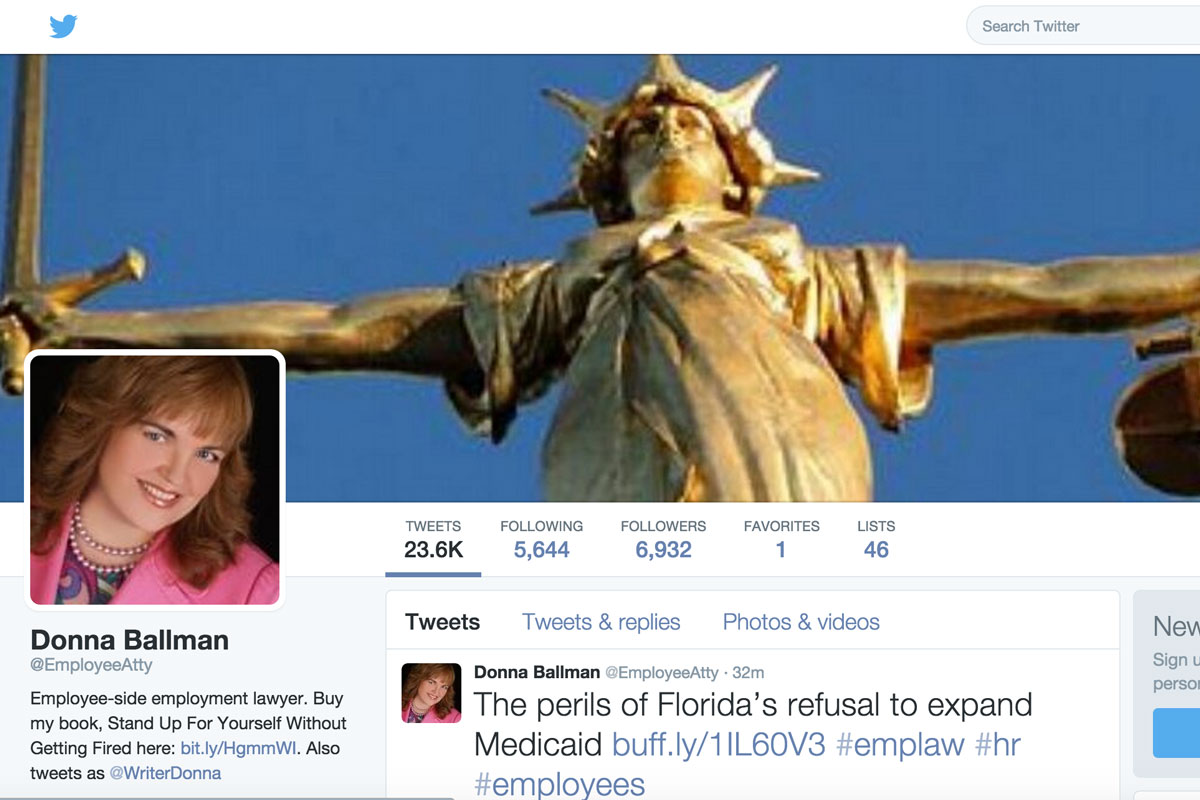
Automated Posting on Twitter
Ballman gives Twitter lots of credit for drawing traffic to her blog. Using the handle @EmployeeAtty, she has collected nearly 7,000 followers. “That more than anything else got word out about my blog,” says Ballman.
To help her crank out a steady stream of tweets, she uses an app called Buffer, in conjunction with Google news alerts to send her daily lists of articles that contain employment-related keywords. “When I find articles that I want to tweet about, or get a Google alert, I stick them in the buffer and it automatically spits them out every hour so. I don’t have to sit there all day long and remember, it’s 2 p.m., I have to post something. It posts them for me. I have developed my following on Twitter through that. I also think that more than anything else is what got me into the ABA 100,” Ballman says.
“I think it helps get information out there and helps people see you as a source of information. You are going to be more respected for that than if you’re just out there saying, ‘use me as a lawyer.’ No one wants to hear that.”
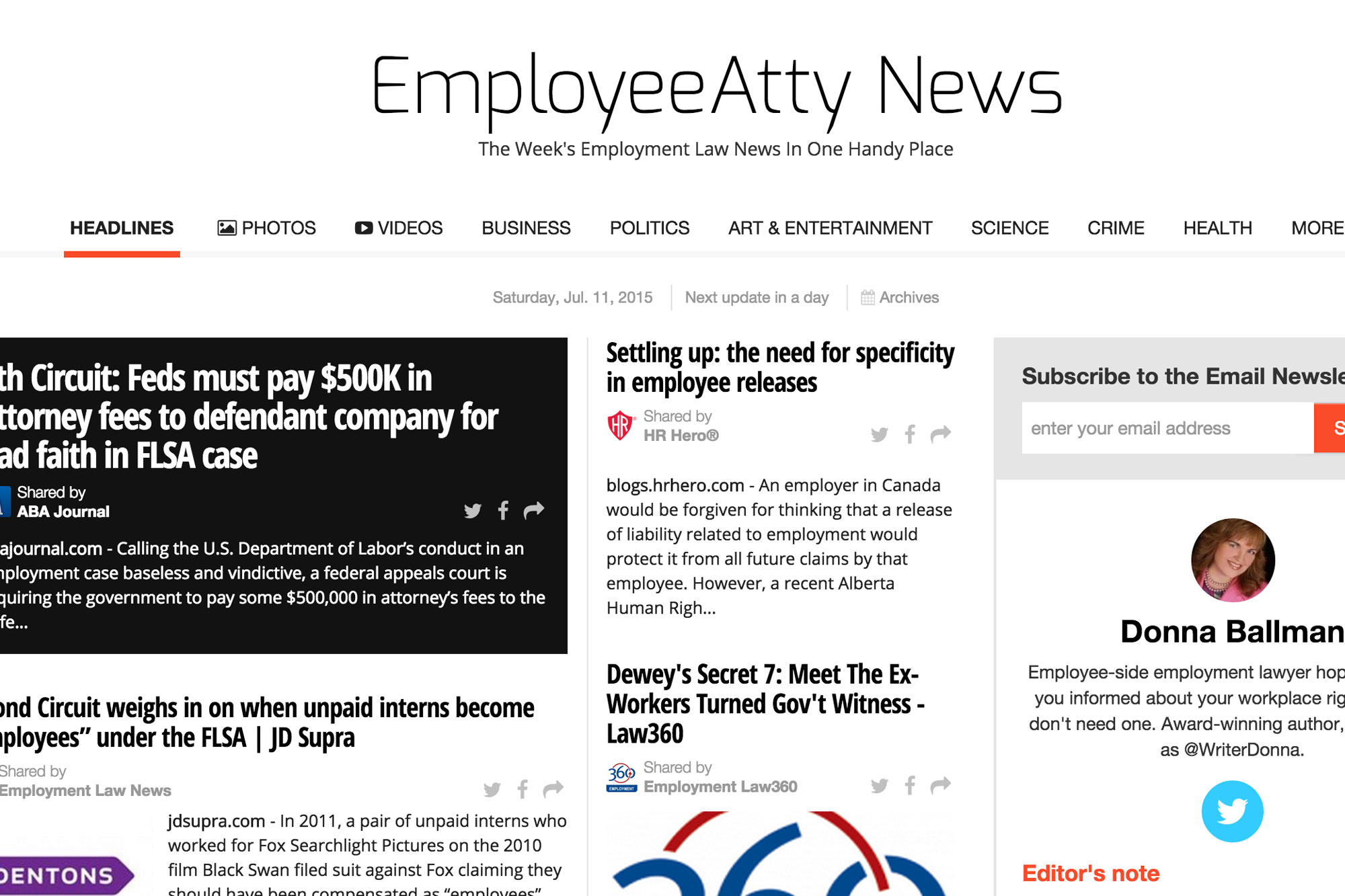
Ballman uses a similar service, called Paper.li, which automatically generates newsletters by collecting and repackaging tweets that match parameters she has set. For her newsletter, EmployeeAtty News: The Week’s Employment Law News in One Handy Place, she says,“I have certain hashtags that I want it to pick up in tweets that are only from a select group of followers that I have on a particular list. It automatically generates a newsletter, so I don’t have to worry about creating content for that on top of articles for my blog and my column.” Her Twitter followers are notified when each new edition is published, and it also displays on her web site.
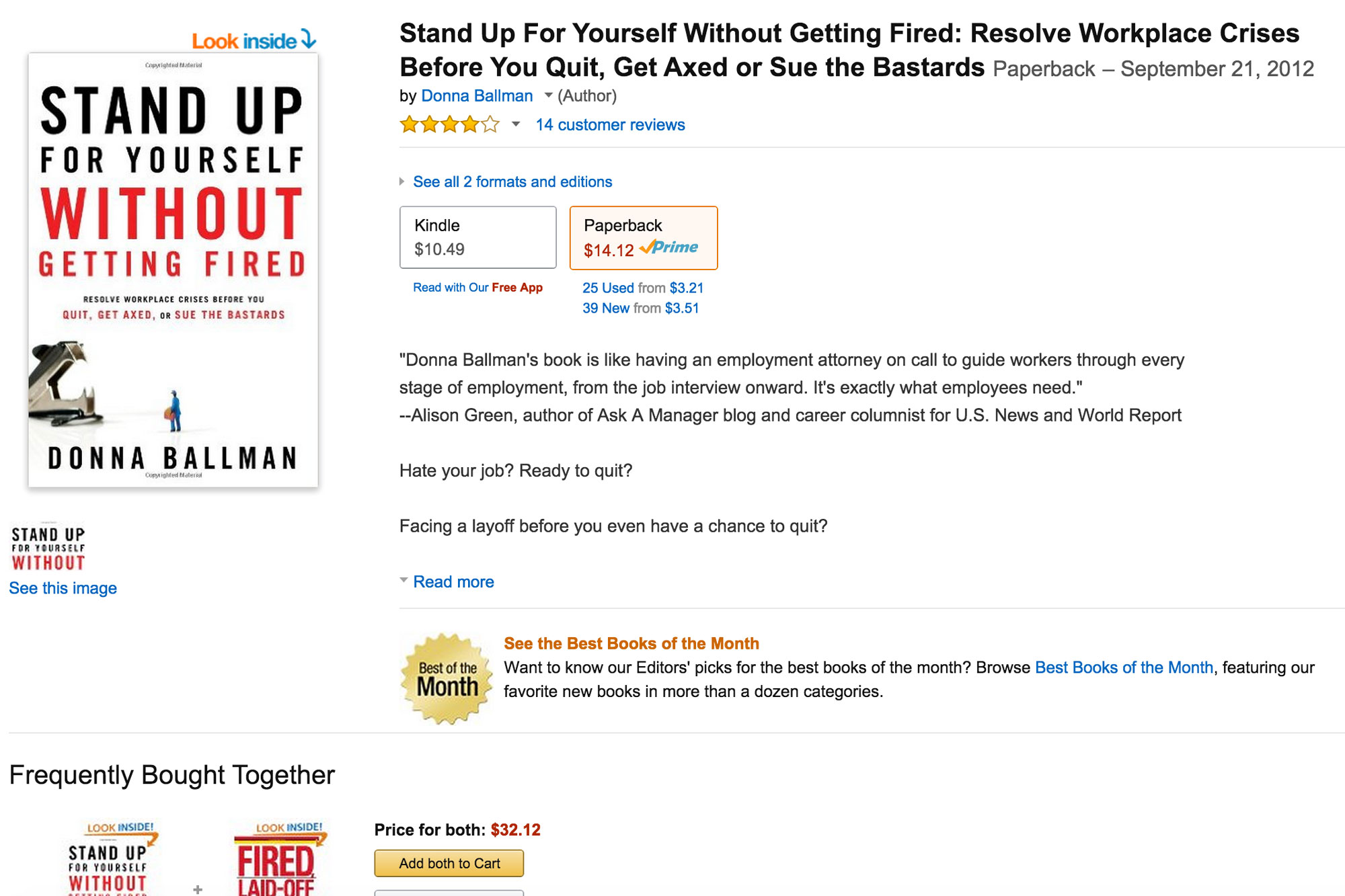
Pros and Cons of Writing Books
Ballman gained additional credibility and visibility in her field by writing a book, Stand Up For Yourself Without Getting Fired: Resolve Workplace Crises Before You Quit, Get Axed or Sue the Bastards. But she is ambivalent about whether books are effective attorney-marketing tools.
“The purpose of the book is actually to help workers avoid situations in which they might need a lawyer, but every once in a while, people come to me because they read the book,” Ballman says. “I would say it does give you credibility with your colleagues. And I think writing a book is worthwhile if you are passionate about a subject and really have something to say. But writing a book is a lot of work, and it probably won’t generate enough business to make up for the amount of time that you put into it. And I don’t think you will be able to retire on the proceeds from a book on a legal topic.”
Building a Reputation from Scratch
For lawyers just starting out, Ballman offers several other pointers drawn from her 30 years in the field. “Obviously get a great web site. Don’t get a cheap web site. And keep updating it. You can’t let a website rot,” she says. “You have to make sure that it is current and you have to make sure that it is relevant. If you are going to do a blog, update it regularly. And use Twitter to get word out about your blog.
“I also always tell young lawyers to go out and start teaching,” says Ballman, who has offered continuing legal education classes to lawyers and accountants through the National Employment Lawyers Association, Sterling Education Services, the Florida Association for Women Lawyers and other organizations. “Reach out to community groups and say you want to give a presentation on a particular topic. Go to bar meetings and offer to present on various topics. Write articles for local papers and newsletters. That’s how you start to develop a reputation. Even starting small, all of that in-person stuff helps.
”I think it’s very hard when you are just starting out to prove to people that you know what you’re talking about. But if you have a bunch of articles online, or if you have been teaching in community groups or have been publishing in newsletters, then you have evidence to show that you have expertise,” Ballman says.

